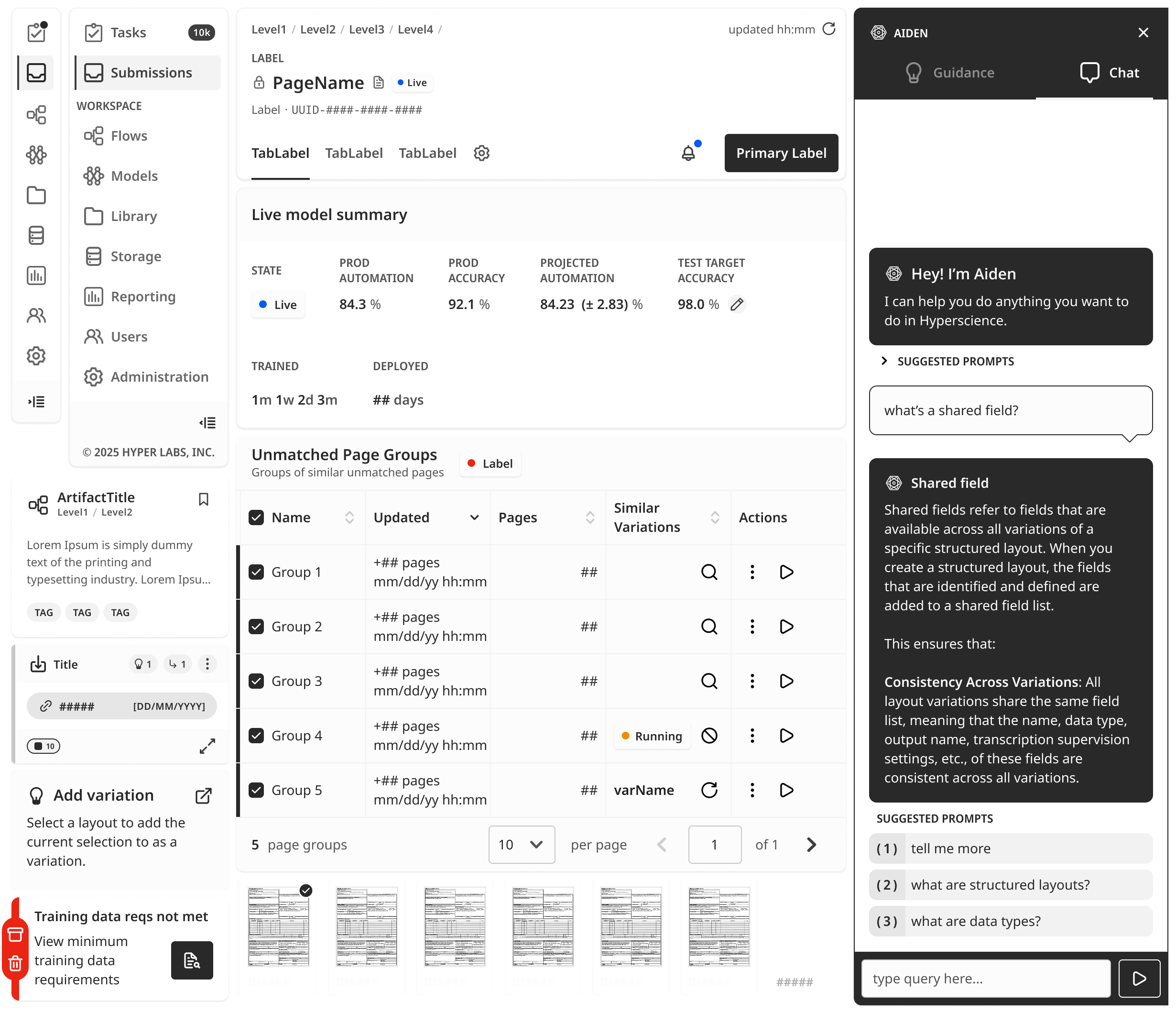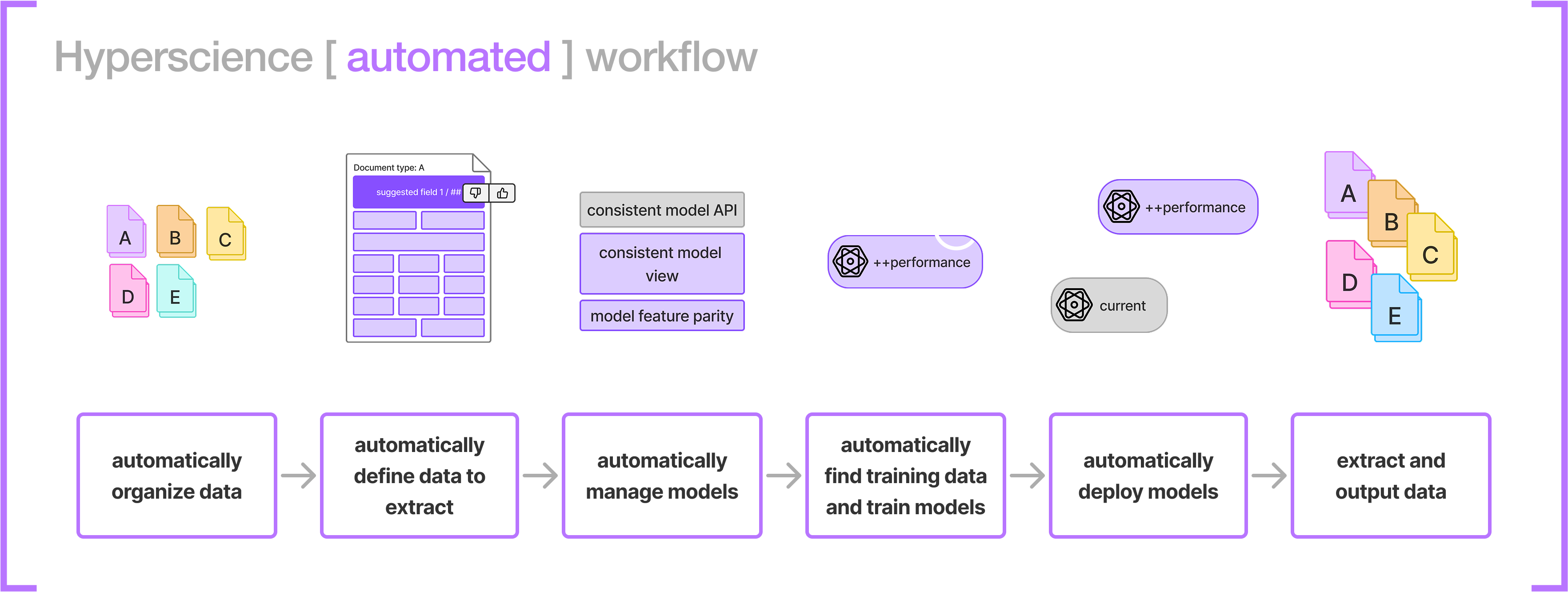(h[s])
HSDS
Hyperscience Design System (HSDS)
case study



automation strategy
I developed a user-centered, data-driven, design-first, 5+ year product strategy for the end-to-end Hyperscience workflow focused on strategic use of machine learning to minimize manual work.
impact
As a result of the strategy that I developed for Hyperscience, use-case implementation and model training times were reduced, allowing customers to onboard new use-cases quickly, with minimized manual work, increased accuracy and optimized automation in the 99% range.
This strategy additionally increased the total addressable market of use cases by enabling faster integration of new models - such as Hyperscience's proprietary VLM model ORCA.
role
product vision, product strategy, product discovery, concept design, user research & testing
team
Design, Product, Engineering
the research
what’s working? what’s not working?
I started out scoped to do a product and user feedback audit for just one specific product surface, but the step-wise dependencies of a complicated enterprise product meant the identified problem themes had compounding effects across the product.
My research and discovery illuminated 3 areas of strengths and friction:
- flexible, but unintuitive
- powerful, but requires subject matter expertise
- many task flows, many dead ends
All of problem areas I discovered share a core theme — lack of a coherent and consistent product strategy tying the experience together.

the challenge
why doesn’t it just work? machine learning is ✨magic✨, right?
Customers were saying the same thing over and over
"The product claims to use machine learning for automating processes, so why am I doing so many things manually?"
The Hyperscience product was using machine learning for very specific document processing and text-extraction tasks, but not applying that same technology across the end-to-end business process automation workflow.
the proposal
automate everything
What if we could make the end-to-end Hyperscience platform deliver on the promise of machine learning? What if we could make the entire product really learn? A product that already knows what you want to do, and the best way to do it?
I focused on injecting automation into every step of the Hyperscience workflow, and applying a model training framework I developed.
The proposed strategy excited Hyperscience's C-Suite, GTM teams, and customers alike with its user-centered approach that delivers what customers really want - maximized automation and reduced manual work.

This is like Steve Jobs with the iPad - it just works!
CEO
@ Hyperscience
I can sell this at the executive level tomorrow!
CTO
@ Hyperscience
This makes me want to break dance.
evp, global revenue
@ Hyperscience
“[Meg] spent months shaping our end-to-end automation strategy, grounding her ideas in insights from go-to-market teams and a deep analysis of customer tickets. The outcome was a systemic approach to document automation—an ambitious vision translated into pragmatic milestones that consistently delivered customer value.”
director of product
@ Hyperscience
The concepts and point of view demonstrated by [Meg] address fundamental gaps in both our competitiveness, as well as strategic issues preventing further expansion with customers.
The ability to automate all phases of the Hyperscience workflow will allow us to address more use-cases faster, increase consumption, and get to full utilization and upsells more successfully.
enterprise account executive
@ Hyperscience
WOW! Amazing. Simply awesome.
sr. director of customer experience
@ Hyperscience
Today feels like christmas
sr. manager, solutions architecture
@ Hyperscience
THIS IS INSANE
manager, solution architecture
@ Hyperscience
the principles
Automate Everything
Automate as many workflows as possible to minimize manual human work.
Human-centered HitL
only Utilize human-in-the-loop for tasks that are done better by humans.
Thoughtful Machine Learning
use machine learning for tasks that can’t be done with more efficient methods.
Sustainability
Expect and plan for future improvements in machine learning and build for scale.
selected strategic initiatives
(h[s])
HSDS
Hyperscience Design System (HSDS)
case study

(h[s])
consistent model mgmt
Enabling users to leverage the power of Hyperscience models
case study
(h[s])
flows evolution
Product vision for Hyperscience Flows
case study
(h[s])
layout copilot
0-1 agentic layout builder for Hyperscience
case study



- ChatGPT
upon checking again, there are indeed two ‘r’ characters in the word ‘strawberry’